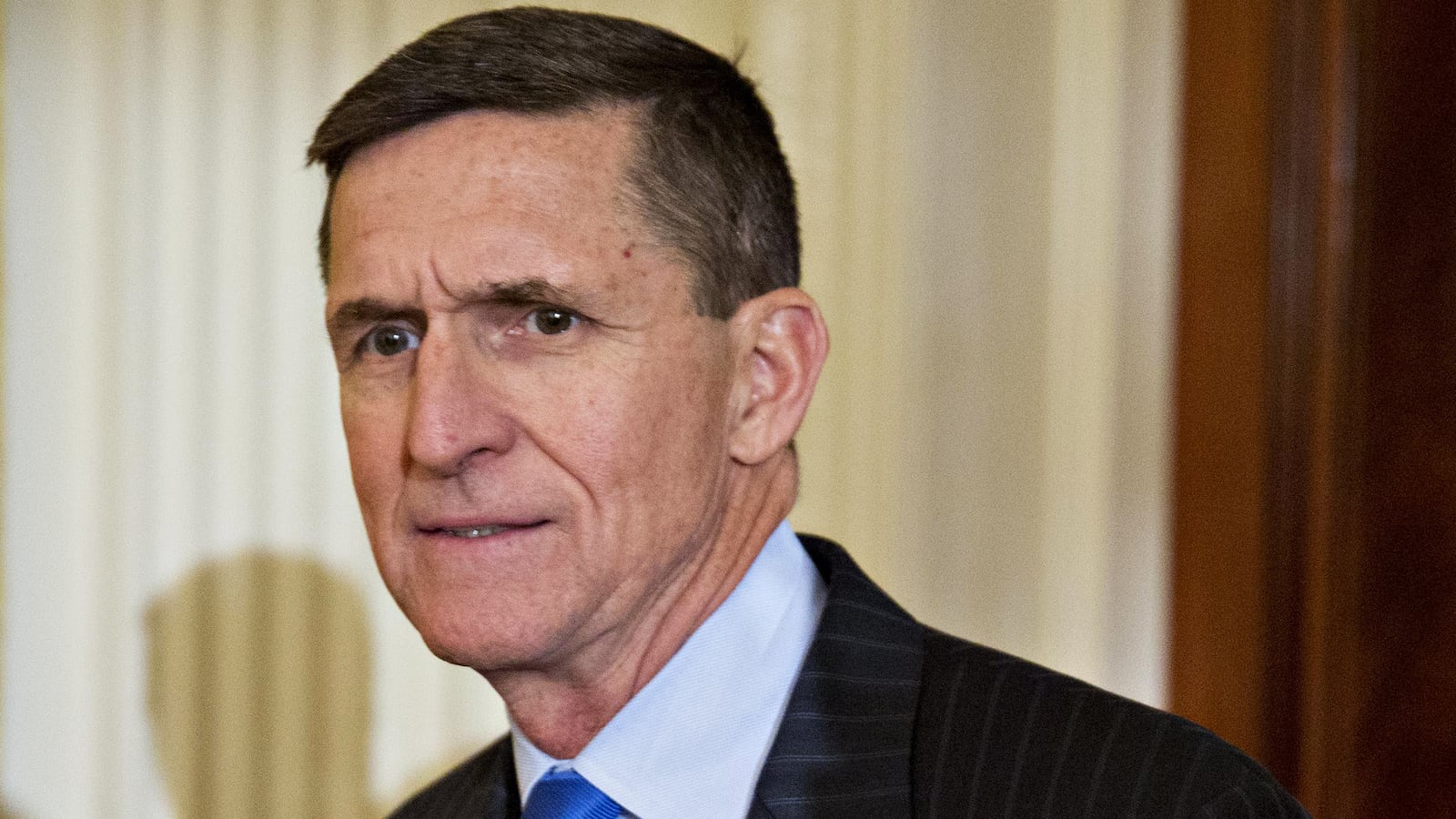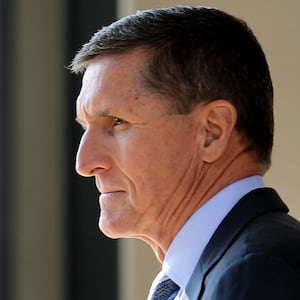Michael Flynn’s sentencing took a stunning turn on Tuesday after a “disgusted” judge questioned whether he could have been charged with treason and then postponed a decision about how much time he should serve.
“Arguably, this undermines everything this flag over here stands for,” U.S. District Judge Emmet Sullivan told Flynn, President Trump’s short-lived national security adviser, who pleaded guilty to lying to FBI agents about his contacts with Russian officials and work for the Turkish government.
“Arguably, you sold your country out.”
The judge’s tongue-lashing added high drama to a proceeding that had been expected to be cut-and-dry because of Flynn’s plea deal with Special Counsel Robert Mueller’s office and Mueller’s endorsement of a no-jail sentence. The final decision rests with Sullivan, and Flynn—who led chants of “Lock Her Up!” against Hillary Clinton at the Republican National Convention—could face up to six months in prison on the lying charge.
The mood in the Washington, D.C., courtroom turned dark when Sullivan unleashed. Flynn, who had come in smiling and back-slapping, left with his jaw clenched for a half-hour recess to decide whether he should ask for a postponement of the sentencing.
When he returned, his lawyers said they wanted a delay. Sullivan agreed to it, but noted that he was making no guarantees Flynn would not be jailed at a later date. All parties will return March 13 for a status conference.
The first inkling that things might not go as planned Tuesday morning came when Sullivan announced that he had concerns about the circumstances of the FBI interview in which Flynn admits he lied about his contacts with Russian officials—issues that Flynn’s lawyers also had raised in recent court filings, suggesting he might have been trapped by the feds.
Sullivan offered Flynn the opportunity to withdraw his guilty plea or to delay the sentencing until he was done cooperating.
Flynn attorney Robert Kelner said his client “stands by his guilty plea” and accepts “full responsibility” for his falsehoods and did not want to back away from his plea agreement with Mueller.
And a prosecutor on a Mueller's team told the judge that Flynn may “possibly” continue to cooperate with their ongoing investigations and had helped them bring charges against a former business partner accused of acting as a foreign agent for Turkey.
But Sullivan wasn't done. After raising questions about the FBI’s questioning of Flynn, he now focused on Flynn’s own actions.
He told Flynn his crime—lying to federal agents as a high-ranking government official while sitting in the White House—was a “serious offense” and that he could not say guarantee a no-prison penalty.
“I’m not going to hide my disgust, my disdain,” Sullivan said.
Then, in an extraordinary moment, Sullivan asked Mueller’s prosecutor, Brandon Van Grack, if Flynn’s actions rose to the level of treason.
“In terms of evidence, treason is not something we have considered,” Van Grack said.
The judge asked if a charge of treason could have been considered. After a long pause, Van Grack said he would not answer the hypothetical question.
The judge called a recess so Flynn could huddle with his lawyers. When Flynn came back, Sullivan backtracked a bit on his earlier comments, saying he did not to mean suggest that the general had committed treason. In fact, Flynn was accused of acting as a foreign agent on behalf on Turkey before he assumed his White House post.
Flynn pleaded guilty just over a year ago to making false statements to federal investigators, which he called in court papers “a serious error in judgement.”
As part of his deal with Mueller, he sat for almost 63 hours of interviews and turned over thousands of documents, his lawyers noted in a sentencing memo. Flynn also met with other Justice Department officials conducting separate investigations.
Flynn served as Trump’s national security adviser for just 24 days before he was pushed out, but he previously served as an adviser to the campaign and is the highest-ranking member of the administration to be charged in the Russia probe.
As Mueller’s team pointed out in a court filing earlier this month, Flynn flipped soon after prosecutors approached him about a cooperation agreement. “The defendant deserves credit for accepting responsibility in a timely fashion and substantially assisting the government,” they wrote to the judge, asking for a lenient sentence.
Flynn also touted his cooperation. Defense attorneys wrote in their sentencing memo: “Having made a serious error in judgment, for which he has shown true contrition, he recognized it was consistent with the values by which he has led his life simply to provide the facts to those charged with enforcing our laws.”
The ever-outspoken military veteran couldn’t help taking a dig at the FBI, however, suggesting he had been duped into a perjury trap by FBI officials with their own baggage—namely Deputy Director Andrew McCabe, who was accused of leaks, and agent Peter Strzok, who was fired over texts that criticized Trump.
“Even when circumstances later came to light that prompted extensive public debate about the investigation of General Flynn, including revelations that certain FBI officials involved in the January 24 interview of General Flynn were themselves being investigated for misconduct, General Flynn did not back away from accepting responsibility for his actions,” the defense attorneys wrote.
That clearly annoyed Mueller’s team, who retorted that Flynn had no one to blame but himself, noting that he lied to the White House weeks before he spoke to the FBI agents.
“Nothing about the way the interview was arranged or conducted caused the defendant to make false statements to the FBI on January 24,” the prosecutors wrote. “The Court should reject the defendant’s attempt to minimize the seriousness of those false statements to the FBI.”
On the eve of the sentencing, prosecutors filed a redacted version of the FBI notes of their interview with Flynn that detailed the various lies he told about his contacts with then-Russian ambassador to the U.S., Sergey Kislyak.







